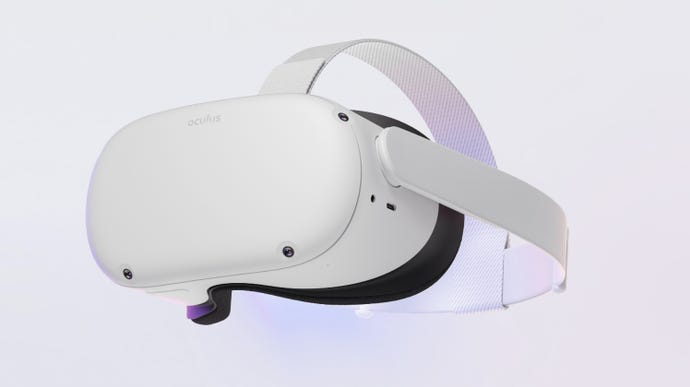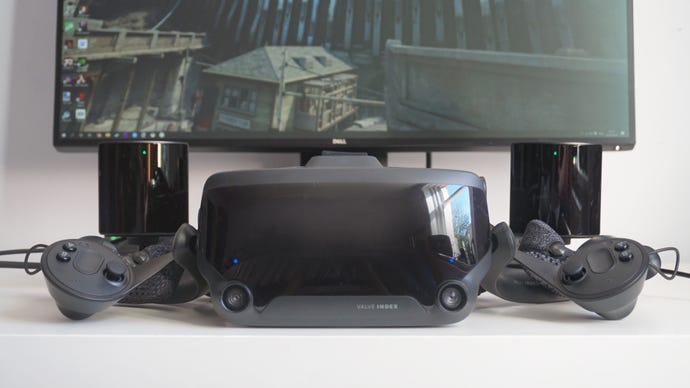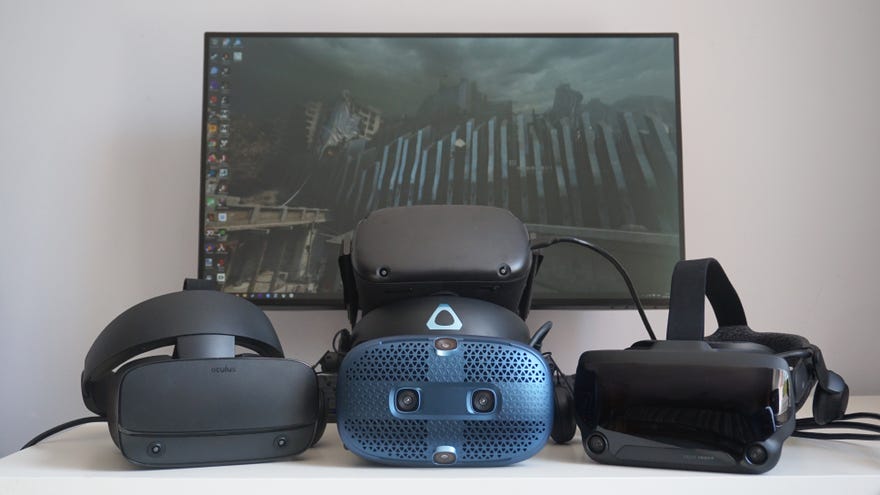Best VR headsets: the best virtual reality headsets for PC
Virtual reality check
Virtual reality hardware seems to be making a comeback in 2023, so don’t be surprised if this guide to the best VR headsets looks different by the end of the year. Besides the versatile-but-pricey Vive XR Elite, the Meta Quest 3 is fast approaching its September release date, and despite a hike on the Quest 2 will still provide a more affordable alternative. There’s also the Apple Vision Pro, but, uhhh... no.
A big yes, on the other hand, to the headsets below. These stalwart sets of eyepieces and wave-around controllers are, for now, your best bets for playing VR games like Half-Life: Alyx and Beat Saber. Give them a hand, and the upper half of a face.
What with this being a PC gaming site, we’re obviously prioritising VR headsets designed to connect to a desktop (or sufficiently powerful laptop). It’s increasingly common for headsets to include their own, onboard CPU/GPU hardware that’s capable of running simple fare in a standalone configuration, but for games that are both bigger in scope and more intricate in detail, so-called PC VR is the way to go.
More specific features to look out for include high lens resolutions, wide fields of view, and hand or finger tracking, which let you interact with VR worlds either without using the controller buttons or even without a controller at all. Of all the ones we've tested, the Valve Index is easily the best VR headset for finger tracking – it’s been on sale since 2019 and no other consumer-grade VR gear has come close to the accuracy of its individual digit-waggling.
For more excursions into virtual reality, check out the best VR games and Reality Bytes: friend of RPS Rick Lane’s regular column on the latest happenings and game releases in VR land.
Best VR headsets
- Meta Quest 2 - the best cheap VR headset for PC
- Valve Index - the best VR headset for PC overall
Meta Quest 2
The best cheap VR headset for PC

The original Oculus Quest showed how much more enjoyable VR can be when you're not tripping over several heavy cables that also happen to be dangling from your head. The Ocu- oop, sorry, forgot the rebrand - the Meta Quest 2 took the concept and made it even better, with a much more lightweight and comfortable chassis and a sharper, clearer display. Somehow, it launched at a lower price than the Quest as well, making it a fine low-cost choice with appeal that endures today.
The Quest 2 uses inside-out tracking, meaning all the trackers are built into the headset and controllers rather than spread across base stations. It's less accurate than external tracking but does mean you don't need to scramble around finding extra plug sockets, or configure your room in a special way to accommodate any external trackers in order to do full room-scale VR. Its inside-out tracking is also noticeably better than what you get on the HTC Vive Cosmos; the only big drawback is that you need a Facebook/Meta account to use it.
There's also the matter of the Quest 2 being on its way out, destined to be replaced by the Meta Quest 3. However, that doesn’t necessarily make it a poor choice right now. For one thing, the Quest 3 announcement has led directly to the Quest 2 getting a £100 / $100 price cut, further cementing it as a budget-friendly headset. Its upcoming replacement improves some specs and reduces headset bulk, but will also move away from that affordability by asking £500 for the 128GB version.
Read more in our Meta Quest 2 review
Valve Index
The best VR headset for PC overall

For those who want the best VR experience that money (a lot of it) can buy, then the Valve Index is the one to go for. Perhaps you've had a VR headset previously and are looking to upgrade, or maybe you've just got buckets of cash and want in at the very top of the VR food chain from the word go. Either way, it really doesn't get much better than the Valve Index.
Its key advantages over cheaper headsets, including the Meta Quest 2, include higher refresh rate options (all the way up to 144Hz), a wider field of view, and absolutely stunning built-in headphones. The speakers and earpieces on other headsets are often fine, but the Index's off-ear headphones are something else entirely, offering a rich, full-bodied sound that really heightens your sense of immersion.
You'll need a pretty powerful PC in order to take advantage of the Index's higher refresh rates, of course, but even if you don't have a super-powered PC right now, it does at least give the headset room for improvement when you next come to upgrade.
Of course, you don't strictly need to spend almost a grand to get a great VR headset, and for most people the Quest 2 will serve just fine. However, if you've got the space and the cash, and want the absolute bestest best VR headset on the market, then the Valve Index is a much better buy than both the Quest 2 and the HTC Vive Cosmos Elite. Besides, it's not like it costs as much as a Vive XR Elite, and certainly not as much an Apple Vision Pro.
Read more in our Valve Index review
What PC specs do I need for a VR headset?
If you're buying a VR headset for PC gaming, then you're going to need to make sure your rig is powerful enough to run it. Thankfully, the minimum requirements for most of today's best VR headsets are pretty low, so you shouldn't have much trouble getting your VR headset up and running if you've recently upgraded your PC. For the full list of minimum requirements, have a read of the table below.
| Minimum PC requirements | Valve Index | Meta Quest 2 | HTC Vive / Vive Pro / Vive Cosmos | Windows Mixed Reality headsets |
|---|---|---|---|---|
| OS: | Windows 10 / 11, SteamOS, Linux | Windows 10 / 11 | Windows 7-11 | Windows 10 / 11 |
| CPU: | Dual-core with hyperthreading | Intel Core i5-4590 / AMD Ryzen 5 1500X | Intel Core i5-4590 / AMD FX 8350 | Intel Core i5-4590 / AMD Ryzen 5 1400 |
| RAM: | 8GB | 8GB | 4GB | 8GB |
| GPU: | Nvidia GeForce GTX 970 / AMD Radeon RX 480 | Nvidia GeForce GTX 970 / AMD Radeon 400 series | Nvidia GeForce GTX 970 / AMD Radeon R9 290 | Nvidia GeForce GTX 1060 / AMD Radeon RX 470 |
| USB: | 3.0+ | USB-C | 3.0+ | 3.0, USB-C |
| Output: | DisplayPort (HDMI not supported) | USB-C (Link Cable), Wi-Fi (Air Link) | DisplayPort (Cosmos) / HDMI (Vive / Vive Pro) | HDMI, DisplayPort |









